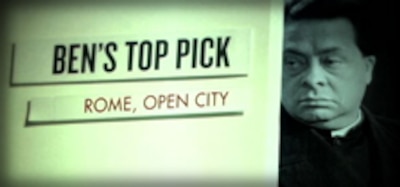Roberto Rossellini

About
Biography
Filmography
Family & Companions
Bibliography
Biography
Often identified with the constrictive "neorealist" label, Roberto Rossellini stands as one of the greatest directors in the history of Italian film: the man responsible for the postwar rebirth of Italian cinema and one of the few truly great humanists (along with Jean Renoir) to work in the medium.
Born into a bourgeois Roman family, Rossellini spent his formative years under Mussolini's fascist fist and, by his early 30s, had drifted into filmmaking--a common pattern amongst the idle Italian rich. He worked with his friend, producer Vittorio Mussolini, the son of "Il Duce," on the script for "Luciano Serra Pilota" (1938), a propaganda film which showed some early marks of a neorealist style. After directing a handful of pictures under the official government banner, Rossellini, the stereotypically apolitical Roman, made an indelible mark on world cinema in 1945 with "Open City." Despite a lukewarm response in Italy, the film was a sensation in France and the US with its raw, near-documentary style: grainy black-and-white photography, amateur performers and real locations. These were elements that audiences had not previously seen in feature films, and "Open City" was hailed as bringing a new kind of realism, "neorealism," to the screen.
While his two subsequent films--"Paisan" (1946, one of his greatest achievements) and "Germany, Year Zero" (1947)--bore the hallmarks of the neorealist style, Rossellini drew increasing critical fire for his use of melodrama (especially through his brother Renzo's musical scores) and Hollywood narrative conventions. He had never been a strict neorealist, however. His aim was to understand rather than recreate reality, sometimes for an expressly pedagogical function (witness his masterful and unusual "The Flowers of St. Francis" 1948), and he incorporated other expressionistic elements into nearly all his work. These elements are particularly evident in films such as the underappreciated "Fear" (1954), with its psychologically based visuals, but had already been partially present in "Open City."
In 1949, Rossellini further challenged the film community's expectations by forming a creative and personal--not to mention scandalous--union with one of Hollywood's greatest stars, Ingrid Bergman. Beginning with "Stromboli" (1949), the pair collaborated over a six-year period on seven films, all of which proved disastrous with both critics and public. (Several years later, however, writers for Cahiers du Cinema were hailing "Voyage in Italy" (1953) as a masterpiece, and its influence is readily apparent in films by French New Wave directors.) By 1958, the two had separated, following revelations of Rossellini's affair with Indian screenwriter Somali Das Gupta. Rossellini's documentary "India" (1958) was a box-office failure, although its critical reputation remains high. Commercial success finally returned with "General Della Rovere" (1959), a wartime Resistance story which also marked a return to the familiar neorealist style; Rossellini would later see the film as a retread of the ideas and forms of his previous successes.
By 1964, Rossellini had been canonized by numerous critics, as well as fellow filmmakers like Jean-Luc Godard and Bernardo Bertolucci (in the latter's "Before the Revolution" 1964, a character declares, "One cannot live without Rossellini!"). Concerned chiefly with the state of cinema and its function as an artistic and educational tool, Rossellini decided to remove himself from the commercial arena. Viewing himself as a craftsman and not an artist, he devoted his creative energies to TV films on science and history: the five-hour "L'Ete del Ferro/The Age of Iron" (1964), the twelve-hour "Lotta Dell'Uomo per la Sua Sopravvivenza/Man's Struggle for Survival" (1967) and the six-hour "Atti Degli Apostoli/The Acts of the Apostles" (1968), as well as biographies of Socrates, Blaise Pascal, Augustine of Hippo, Descartes, Jesus and Louis XIV. Only the latter," The Rise of Louis XIV" (1966), has received its due acclaim, chiefly because it is one of the few to have been screened theatrically.
Filmography
Director (Feature Film)
Cast (Feature Film)
Writer (Feature Film)
Producer (Feature Film)
Editing (Feature Film)
Cast (Short)
Life Events
1934
Began working in film industry as editor, dubber, screenwriter (date approximate)
1937
Made amateur film, "Prelude a l'apres-midi d'un faune" (banned by Italian censors)
1938
First screen credit as writer of "Luciano Serra, Pilota" (also directed some sequences)
1941
First feature as director, "La Nave Bianca/The White Ship" (expanded from original documentary form)
1945
Made breakthrough film, "Roma, Citta Aperta/Rome, Open City"
1949
Made first film with Ingrid Bergman, "Stromboli"
1954
Made last film with Ingrid Bergman, "La paura/Fear"
1977
Directed last film, "The Messiah"
1985
Posthumously appeared in Jonas Mekas' experimental compilation of sketches, "He Stands in a Desert Counting the Seconds of His Life"
Videos
Movie Clip












Promo
Family
Companions













